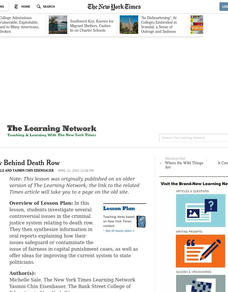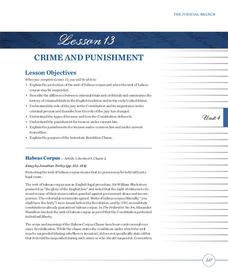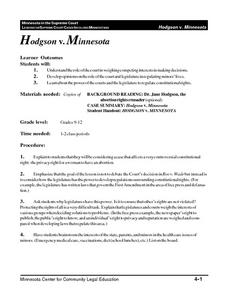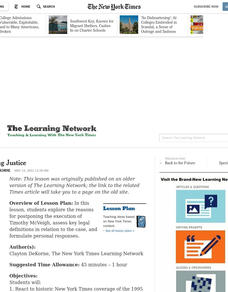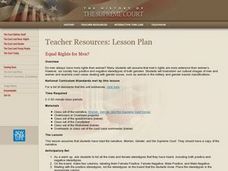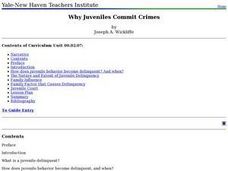Curated OER
A Cultural Defense to Crime?
Learners define a "defense to a crime" and identify various defenses to crimes in Utah. They examine "cultural defense" and apply it to case studies.
Curated OER
The Row Behind Death Row
Students investigate several controversial issues in the criminal justice system relating to death row and give oral reports explaining how their issues safeguard or contaminate the issue of fairness in capital punishment. They offer...
Heritage Foundation
Crime and Punishment
You wouldn't give someone a 10-day timeout for eating a piece of candy. The US government, too, does not believe in unreasonable punishment. A variety of exercises exploring the clauses of the US Constitution prompts class members to...
Judicial Learning Center
Your Day in Court
Whether out of choice or necessity, people want to know what will happen on a typical day in court. A helpful lesson walks scholars in the field of criminology through the trial process from opening statements to the final verdict.
Judicial Learning Center
The Judge and the Jury
Unless you are a lawyer, you might not understand just how unrealistic Law and Order and other legal dramas actually are. Here's a great resource to help scholars of criminology gain a more realistic perspective. The lesson outlines the...
Curated OER
Children's Accountability for Their Crimes
Students participate in a round-table discussion about the juvenile justice system and investigate the 'age of accountability' debate. They write a persuasive essay supporting or refuting the punishment received by the children discussed...
Curated OER
Teens on Trial
Learners read about the public reaction to the conviction of Alex and Derek King, and explore the issue of child offenders being tried and sentenced as adults. They compose letters to Florida Governor Jeb Bush, outlining their opinion on...
Curated OER
Judges in the Classroom Lesson Plan Juvenile Justice - Introduction
Students study the meaning of juvenile and various ways that young offenders are treated.
Curated OER
Symbolic Speech
Ninth graders consider the right of freedom of speech as it is outlined in the U.S. Constitution. They receive background information for the US Supreme Court, the Bill of Rights, and free speech. They discuss a series of actual cases...
Curated OER
Hodgson v. Minnesota
Students investigate the role of and develop opinions of the court in weighing competing interests in making decisions. They examine the power of the courts and legislature to regulate constitutional rights.
Curated OER
Executing Justice
Students explore the reasons for postponing the execution of Timothy McVeigh, assess key legal definitions in relation to the case, and formulate personal responses.
Deliberating in a Democracy
Crime and Punishment
Should the United States ban the death penalty? Scholars use real-life examples of criminal activity to come to their own conclusions on the death penalty. Primary source documents, as well as video clips, open the issue of capital...
Curated OER
Criminal Law -- Miranda
Students examine the law and the Miranda rights. They role play members of law enforcement and ones being arrested.
Curated OER
The Jury's Still Out
Learners examine the trials and executions of Nicola Sacco and Bartolomeo Vanzetti. In groups, they use the internet to research the impact of the executions in the shape of political cartoons and writings. They discuss an article to...
Curated OER
Mock Trial
Students rewrite a traditional fairy tale to represent the viewpoint of the villain. They participate in a mock trial of that villain in which all regular court participants (judge, jury, defendant, witnesses, plaintiff, etc) play roles.
Curated OER
Equal Rights for Men?
Study the issue of gender bias in court cases with a resource that ponders the extent of gender equality. Learners examine cultural images of men and women and examine court cases dealing issues such as women in the military.
Curated OER
Why a Mock Trial?
Students participate in a mock trial. They discover how U.S. courts resolve conflicts.
Curated OER
Plea Bargaining
Students explore plea bargaining and list the advantages and disadvantages of it.
Curated OER
Why Juveniles Commit Crimes
Students examine the reasons why juveniles commit crimes. As a class, they watch movies showing juveniles committing crims and discuss the impact on societies. They take a field trip to adult and juvenile courts and compare their...
Curated OER
Guilty to a Fault
Learners consider the moral and legal issues involved in distinguishing a verdict of murder from one of manslaughter (criminally negligent homicide) and write an essay describing the issues involved in the case that was researched.
Curated OER
What is a Court?
Students examine and discuss the judicial branch of the U.S. government. They define what a court is, list three characteristics of a trial court and an appellate court, and analyze various trial and appeal situations.
Curated OER
Tort Liability: Mock Trial
Students explore the trial process and the tort concept of host liability.
Curated OER
Civil Rights and the Michigan Supreme Court II
High schoolers view a PowerPoint presentation on the Michigan Supreme Court Historical Society's Civil Rights and/or the Native American Rights. They write a reaction paper and prepare for a class discussion. They work in groups and...
Utah State Courts
Judges in the Classroom
Class members explore the process of a disposition hearing for juveniles, particularly looking at how the judge decides what sentence the juvenile offender should receive. Task your pupils with evaluating different sample cases provided...



